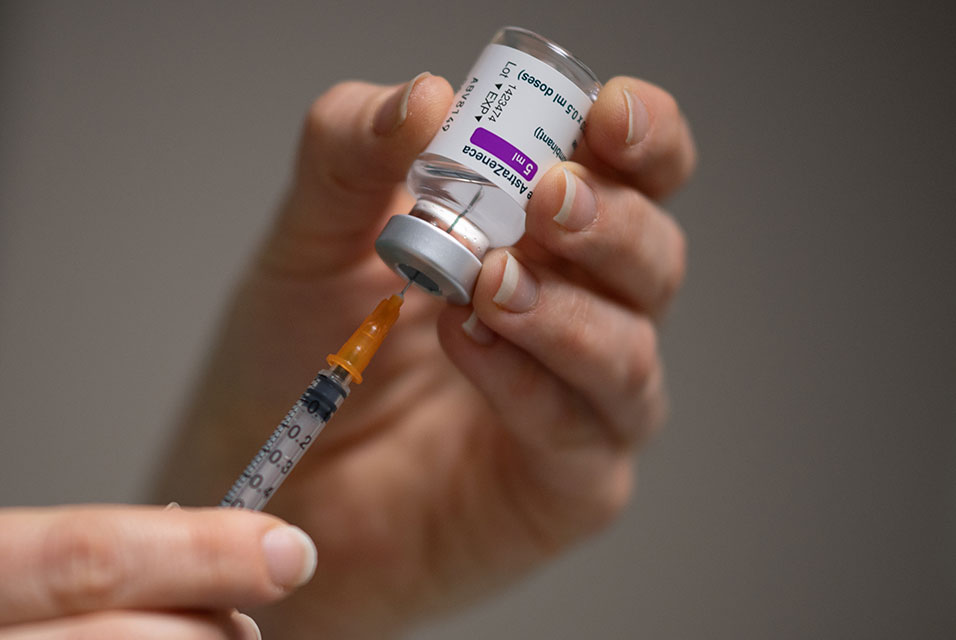LONDON (AFP).- Cheap and easy to store, the Oxford-AstraZeneca vaccine has boosted the global fight against coronavirus but fears over cases of rare blood clots and production delays have marred its rollout.
Here are five facts about the vaccine.
Practicality
The AstraZeneca vaccine costs about £2.50 ($3.40, 2.75 euros) per dose and can be kept at refrigerator temperatures, making it ideal for large-scale vaccination programmes.
The vaccine has been authorised for use in more than 70 countries, AstraZeneca says.
More than 9.2 million jabs have been administered in the European Economic Area, including the EU, Norway, Iceland and Liechtenstein.
Blood clot fears
Cases of rare blood clots in vaccinated people have prompted numerous countries to halt or limit rollout.
The European Medicines Agency (EMA) said on March 31 that there had been 62 cases worldwide of a rare clotting condition, cerebral venous sinus thrombosis, 44 of them in the European Economic Area.
Thirty cases of rare blood clotting conditions have been recorded in Britain, and seven people have died.
AstraZeneca said in mid-March that there was "no evidence" of higher risk of blood clots from its vaccine.
But as a result, Denmark and Norway have paused vaccinations.
Some countries rejected a batch of vaccines after an Austrian nurse died from multiple thrombosis following vaccination and another person suffered a pulmonary embolism.
Many countries have resumed the vaccine's use only for older people, aged 55 and above, because the blood clots affected younger people.
These include France, Canada, Germany, the Netherlands, Finland, Iceland and Sweden, as well as Canada.
The EMA said March 18 that the AstraZeneca jab is safe and effective.
Some countries including Estonia, Latvia, Lithuania, Luxembourg, Portugal, Italy, Ireland and Spain resumed full rollout after reassurance from the EMA.
The EMA is expected to announce updated advice on April 7.
Delays in delivery
The vaccine was first approved for use in the general population in Britain, which ordered 100 million doses.
In the EU, delivery delays have led to strong criticism of the Anglo-Swedish firm.
AstraZeneca announced in January it could only deliver one third of the 120 million doses initially promised to the 27 member states in the first quarter.
In March, Italy blocked the export of 250,000 doses to Australia, citing "persistent shortage" and "delays in supply", a move backed by the European Commission.
EU member states were set to receive 29.8 million doses of the AstraZeneca vaccine by the end of March, the European Commission said.
Chimpanzees
The vaccine is "virus-vectored", meaning it is a version of a virus that normally infects chimpanzees and has been modified with a portion of the Covid-19 coronavirus called the "spike protein" to fire the immune system.
Once in human cells, the vaccine should help stimulate the production of antibodies that recognise the virus.
The vaccine is "safe and effective", according to data published by The Lancet medical journal in December, with only one of 23,754 volunteers who participated in the trials experiencing "possibly-related severe side effects".
This was a case of a rare neurological condition that forced the temporary suspension of trials.
Result confusion
AstraZeneca announced in interim findings in November that its vaccine was on average 70 percent effective, compared with more than 90 percent for Pfizer/BioNTech and Moderna.
The efficacy of the AstraZeneca vaccine was 90 percent for volunteers who first received only a half dose and then a full dose one month later, but only 62 percent for those in another group who were vaccinated with two full doses one month apart.
The injection of a half dose was conducted by accident, raising criticism over the robustness of the results and prompting the company to conduct additional studies.
A more recent study conducted by health authorities in England has shown protection of between 60 percent and 73 percent against symptoms in people over 70 years old, with a single dose.
Last month, AstraZeneca announced a US trial showed 79 percent effectiveness but then revised this to 76 percent after the US authorities raised concerns that some results were outdated.
The US has not yet approved its use domestically.
© Agence France-Presse










